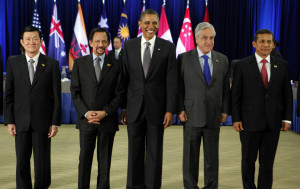Trans-Pacific Partnership: Implications for Southeast Asia
The Trans-Pacific Partnership, one of the biggest trade deals of the 21st century, involves twelve signatory countries including the U.S., Canada, Japan, Chile, Peru, New Zealand, Australia, Brunei, Malaysia, Vietnam, and Singapore. Negotiations for the treaty concluded last week on October 5th after approximately five years of intense debate. Since the countries involved contribute to 40% of the world’s GDP, the deal’s impacts go beyond simple economics, affecting the political situation within the countries of Southeast Asia.

What this Deal Means for Southeast Asia
Most media has focused on the TPP as a trade deal of massive proportions, but few have analyzed the significant financial and social reforms to the countries involved that the deal will bring about. Opening the playing field to foreign investors while introducing progressive labor standards and environmental protections are some of the critical effects that particularly impact Southeast Asia.
Countries such as Vietnam and Malaysia who maintain some of the world’s highest tariffs and non-tariff barriers against foreign businesses have decided to open their doors. This begs the question- why? Preliminary studies – conducted by the Peterson Institute – expect the TPP to enlarge the participating economies by $285 billion by 2025 through increasing both GDP and exports. The TPP is also set to boost the production and export of electrical equipment, textiles, construction and machinery in Vietnam and Malaysia. The deal carries some obvious economic consequences but the more political implications of the deal remain hidden.
In order to gain exclusion into the deal, countries had to meet certain international criteria in regards to political and economic freedom. For example, in Vietnam, the ruling Communist party had to concede to privatization of its bloated state owned enterprises sector, meaning that more businesses will be outside of the central government’s control. State owned enterprises make up approximately one-third of Vietnam’s GDP and have led to high levels of inflation, dragging the economy down for years. The TPP not only has the potential to force the garment industry in Vietnam to become increasingly privatized, but it can also increase labor rights for domestic citizens. U.S. officials have argued that joining the TPP will force Vietnam’s government to continue fundamental political and economic reforms by granting Vietnamese laborers freedom of association and the right to form labor unions.
Malaysia will also have to change underlying political and social issues before it can reap benefits from the deal. The State Department's human trafficking analysis of Malaysia describes the country as "a source and transit country for men, women, and children subjected to forced labor and women and children subjected to sex trafficking." The department cites forced labor problems in Malaysia's palm oil and electronics industry, . The State Department report says Malaysian "public officials ... may profit from trafficking." As such, Malaysia will need to improve on these issues before it can reap the economic benefits from the trade agreement.
Future Legal Implications of the Deal
The TPP could have potential implications for the future of international trade. For example, international arbitrators will be responsible for dealing with conflicts of policies, and it will not involve any form of domestic government approval. This dispute resolution process can actually override domestic policies within a country without any outlet for reversal. Therefore, countries in Southeast Asia may see economic gains at the expense of having control over their domestic affairs.
Even though negotiations have ended, the deal has to be approved by all twelve country’s domestic governments before it actually has any administrative power. This is critical because the deal includes sections where domestic sovereignty is bypassed for the sake of a more open system of international trade. Southeast Asian countries have the most to gain from the deal economically, which may foster support for the deal regardless of its domestic policy implications. As a result, the TPP’s dream of setting high standards for international trade, environmental protection, labor, and human rights within Southeast Asia remains a very real possibility.
